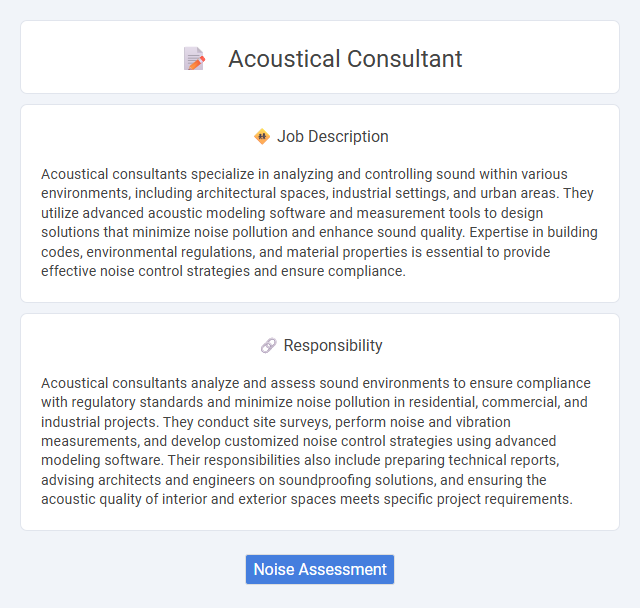
Acoustical consultants specialize in analyzing and controlling sound within various environments, including architectural spaces, industrial settings, and urban areas. They utilize advanced acoustic modeling software and measurement tools to design solutions that minimize noise pollution and enhance sound quality. Expertise in building codes, environmental regulations, and material properties is essential to provide effective noise control strategies and ensure compliance.
People with strong analytical skills and a keen interest in sound science are likely to excel as acoustical consultants. Those who enjoy problem-solving in diverse environments and can handle technical details may find this role particularly suitable. Individuals who prefer routine or less interaction with clients might face challenges adapting to this dynamic profession.
Qualification
An acoustical consultant typically requires a bachelor's degree in acoustics, physics, engineering, or a related field, with many roles preferring a master's degree specializing in acoustical engineering or environmental acoustics. Professional certifications such as the Institute of Acoustics (IOA) Diploma or Certified Acoustic Consultant status enhance credibility and demonstrate expertise in noise control, soundproofing, and acoustic design. Strong analytical skills, proficiency in sound measurement tools, and experience with acoustic modeling software are essential qualifications to effectively advise on sound management in architectural, environmental, and industrial projects.
Responsibility
Acoustical consultants analyze and assess sound environments to ensure compliance with regulatory standards and minimize noise pollution in residential, commercial, and industrial projects. They conduct site surveys, perform noise and vibration measurements, and develop customized noise control strategies using advanced modeling software. Their responsibilities also include preparing technical reports, advising architects and engineers on soundproofing solutions, and ensuring the acoustic quality of interior and exterior spaces meets specific project requirements.
Benefit
Hiring an acoustical consultant likely improves sound quality by accurately assessing noise levels and recommending effective control measures. This expertise may enhance building compliance with regulations, potentially reducing legal risks and costs. Clients might benefit from optimized acoustic environments, leading to increased comfort and productivity.
Challenge
Acoustical consultants likely face the challenge of balancing technical precision with practical design constraints to ensure optimal sound quality in complex environments. They are expected to interpret and apply intricate acoustic modeling and noise control technologies, which may require continuous learning and adaptation. Projects may also demand effective communication with diverse stakeholders to align acoustic goals with architectural and regulatory requirements.
Career Advancement
Acoustical consultants specialize in noise control, soundproofing, and environmental acoustics, providing expertise to improve audio quality in various settings. Career advancement often involves gaining certifications such as the Board of Certified Acousticians (BCA) or Certified Industrial Hygienist (CIH), enhancing technical skills in software for acoustic modeling, and developing strong project management capabilities. Progression can lead to senior consultant roles, project leadership, and opportunities to influence building codes, environmental regulations, or specialized acoustic research.
Key Terms
Noise Assessment
Acoustical consultants specializing in noise assessment analyze environmental and industrial noise levels to ensure compliance with local regulations and standards such as ISO 1996 and EPA guidelines. They conduct field measurements, use advanced modeling software like CadnaA or SoundPLAN, and provide detailed reports that recommend noise mitigation strategies. Expertise in assessing impact from transportation, construction, and urban development projects is essential for optimizing soundscapes and protecting public health.
 kuljobs.com
kuljobs.com